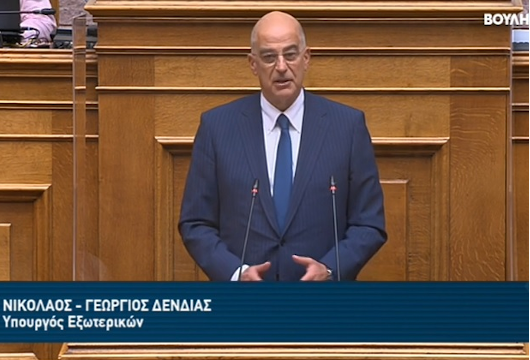 Minister of Foreign Affairs Nikos Dendias’ interventions at the Parliamentary Standing Committee on National Defence and Foreign Affairs during the elaboration and examination of the Ministry of Foreign Affairs’ draft law “Ratification of the Agreement between the Government of the Hellenic Republic and the Government of the French Republic on establishing a strategic partnership for defence and security cooperation” (05.10.2021)
Minister of Foreign Affairs Nikos Dendias’ interventions at the Parliamentary Standing Committee on National Defence and Foreign Affairs during the elaboration and examination of the Ministry of Foreign Affairs’ draft law “Ratification of the Agreement between the Government of the Hellenic Republic and the Government of the French Republic on establishing a strategic partnership for defence and security cooperation” (05.10.2021)
Thank you so much, Mr. Chairman,
Ladies and gentlemen,
First, please forgive a certain feebleness and lack of sharpness in my speech. I consider it absolutely necessary to be completely level-headed when debating issues of national importance. But then again, this is probably due to the fact that I received the third dose of the vaccine this morning and therefore it may have a drowsy effect.
The Mitsotakis government is introducing today in Parliament the Strategic Partnership Agreement for defence and security cooperation with the French Republic.
We, the government majority and, as far as I’m aware, a large part of the Parliament, maintain that the Agreement strengthens the defence shield and the geopolitical standing of the country. It is a demonstration of the strong and long-standing ties with France. It is also symbolic: 200 years since the Revolution of 1821, 40 years since our accession to the then EEC.
It can be said that this is a work that pays homage to two great leaders, Konstantinos Karamanlis and Valéry Giscard d’Estaing who passed away a few months ago. Leaders who, I think we all agree, were ahead of their time.
We and France are taking a step together, so we believe, towards a united Europe, towards European integration in the fields of security and defence.
Ladies and gentlemen, the Agreement does not only provide for the systematization of cooperation and contacts. It mainly provides for the commitment of the parties to provide aid and assistance by all appropriate means, including the use of armed force.
The relevant wording is contained in Article 2 of the agreement.
I wish to be clear to you, because I have heard various comments on the interpretations of Article 2. The wording of article 2 of this agreement as it stands is the most advanced internationally. Anyone who claims it is inadequate would do well to bring us an example of an international agreement that contains a more wide-ranging wording. Because departing on abstract legal quests, as our rapporteur and one of our speakers previously said, and in fact weakening the image of this agreement internationally, is not in the national interest.
I am not going to bring any examples. If you wish, I will do so at briefings in the Ministry of Foreign Affairs, which I have never refused to give. But this cannot be done in the context of this parliamentary public debate.
However, I repeat; if you consider the wording of this Article to be inadequate, bring us a more comprehensive international example from anywhere, between any countries.
Please look at the wording of the well-known AUKUS – which became a subject of discussion internationally, the number one subject of discussion for a week – and you will see how less elaborate it is. And this is supposed to be the cooperation between Australia, the United States and the United Kingdom, which constitutes the superpower’s response to the greatest geopolitical challenge in its history.
And I am honestly referring to SYRIZA, the largest opposition party, as our interlocutors in this effort. I do not perceive your position not to vote for the Agreement as final.
Allow me, Mr. Chairman, a reading of the situation. Allow me also to say that I detected two party lines; the line of the rapporteur, my dear professor Mr. Katrougalos and the line of Mr. Filis. To the ears of a bona fide, I assure you, observer, these two lines did not sound similar; not at all similar, you heard it yourselves.
What is our strategic aim? Is our strategic aim to have this agreement with France and other countries or not? Don’t we want it? Do we belong to a different framework of values and think that maybe society itself – strengthened by whatever methods one judges to be appropriate – will embark on a campaign and face the threat? Each party should demonstrate consistency in its opposition.
I would like to say that this Agreement is the second in the post-war history of the country. Both have been concluded by the Mitsotakis Government, I had the honour to sign them both as Minister of Foreign Affairs. The first one was with the United Arab Emirates.
Since the end of World War II until today, Greece had never managed to make such an agreement. Unless we believe that we have never been threatened by any other country and these agreements are useless. But if there is such a view let it be said. However, I have clearly heard the rapporteur of the main opposition party say that it is a strategically correct agreement and I commend his position.
Ladies and gentlemen, the Mitsotakis Government has done the best it can in foreign policy, demonstrating seriousness and responsibility. Since taking office – in case you care about statistics – it has signed 106 bilateral agreements, in addition to the agreement we are discussing today. I am referring to the whole government. It has also signed 39 multilateral agreements. That is 106 plus 39.
Some of them, allow me to characterize them – after all I believe it is our common ground – as of the utmost importance, the achievement of decades-old objectives.
I am referring to the Agreement with Italy on the delimitation of the EEZ;
The Agreement with Egypt on the delimitation of the EEZ;
The Protocol of Amendment to the MDCA;
The Memorandum of Understanding with the Arab League;
The aforementioned Agreement with the United Arab Emirates;
The Memorandum of Understanding for the establishment of consultations with the Gulf Cooperation Council;
A series of agreements on energy issues;
And of course, the Agreement in principle with Albania to have recourse to the International Court of Justice in The Hague for the delimitation of the EEZ; also, agreements with 37 other countries, such as Chile, Brazil, Indonesia, Mongolia.
We have been accused of attempting to draw political capital from this Agreement with France. We have not attempted to exploit any of these agreements, the 106 plus 37 agreements; none of them. The competent Minister, that would be me, was not instructed by the Prime Minister to appear on television and boast about any of these agreements.
Who is attempting to play politics? On the contrary, we have tried, and I think we are proud of that, to keep foreign policy away from party politics. And we had made it clear in the government’s policy statements that we would seek unity and solidarity. And we did not ask for a blank check. We encouraged criticism, dialogue and opposition.
We believe, however, that when it comes to the basic parameters of a strategy, we should all be on the same side; because the geopolitical environment is constantly changing. I do not think such a period has ever existed in modern history.
The variables are unprecedented and we have a neighbour, let me call him particularly expansionist, so as not to say extremely aggressive. And to this neighbour, Turkey, we respond wherever needed; both in public and in our bilateral dialogue and in international fora. We explain, I believe adequately, the legal absurdity of its positions.
We reveal its Ottoman expansionism.
Because with Turkey one often feels that one does not understand what it is seeking.
Turkey claims it respects International Law. It violates, however, almost all the articles of the United Nations Charter concerning the preservation of peace and security.
It claims that it respects the Law of the Sea. But it has not acceded to the UN Convention on the Law of the Sea, which has been ratified by 160 states.
It claims it seeks peace and stability. But it has invaded five countries in the region.
It claims it seeks a just solution to the Cyprus issue. Yet it is attempting to impose a two-state solution blatantly disregarding international legality, and it is illegally occupying more than 37% of Cypriot territory.
It claims that it seeks dialogue with Greece and Cyprus. But it maintains the casus belli, the threat of war against Greece. It contests on a daily basis the sovereignty and sovereign rights of both Greece and the Republic of Cyprus.
It claims to respect human rights. Yet it refuses to implement more than 640 judgments of the European Court of Human Rights.
It claims that it promotes freedom of religion, that it respects world cultural heritage. Yet it converts into mosques monuments of the world cultural heritage, such as Hagia Sophia and the Monastery of Chora.
The list of such contradictions is endless. I could talk for hours. I would like to tell you, however, what you probably do not know yet because it was received only yesterday afternoon.
The latest contradiction is Turkey’s reply letter to the UN regarding the “demilitarization” of the Aegean islands.
Turkey claims that our country is illegally maintaining an army on these islands; meaning that these islands threaten Turkey. The Greek islands of the Eastern Aegean threaten Turkey. It is Turkey that maintains the Aegean Army facing them. The allegedly threatened Turkey maintains the largest landing fleet in the Mediterranean opposite these islands.
It has issued a threat of war against Greece if we extend our territorial waters by exercising our legal right. It is the only country, the only country on the planet that has issued a threat of war against another country for exercising legal rights. And of course, the invasion of the Island of Cyprus in its past.
This Turkey, with this past and these contradictions, is asking us to disarm the islands of the Eastern Aegean.
You understand that this can only be ostentatiously rejected for the umpteenth time by this government, following all previous governments.
However, ladies and gentlemen, the Mitsotakis government does not suffer from a Turkey-centric Balkan provincialism. Our policy is not a reaction to Turkey. We have our own planning, a national planning.
This national planning concerns primarily the states of Europe, with which we are strengthening our relations, but, beyond that, we are advancing our alliances with countries such as the United States, the Gulf countries and the wider Arab world; through multilateral cooperation – such as the Philia Forum that we hosted in Athens. Through our relations with Israel.
We are advancing our relations with the member states of the UN Security Council. It is my firm belief – I think everyone shares it – that our country should always maintain relations not only with the permanent but also with the non-permanent members of the UN Security Council.
And in this context, I would like to tell you something you already know, that the country is conducting an “election campaign” to become a non-permanent member, to be elected as a non-permanent member of the UN Security Council for the 2025-2026 term.
And I would like you to know something I think is sufficient proof of the credibility of our country, that we have secured 93 pledges in our favour so far. Ninety-three. Only four remain to reach an absolute majority. We have 93. And we are still in 2020 -2021.
And I believe we have also made progress in our relationship with Russia.
I have visited Russia several times. In fact, after 30 years I found myself close to the Hellenism of southern Russia. I think it is a great investment.
We maintain our relations with China. In a few days, my Chinese counterpart, Mr. Wang Yi, will come to Athens.
I will also go to London in October. Our post-Brexit relationship – especially after Brexit – with Great Britain must also acquire a contractual framework.
As for the non-permanent members of the UN Security Council, I hope you have noticed the visit of the Indian Minister of External Affairs.
At the same time, we are developing relations with a number of states, relations that the country has never had before, in fact with some of their Ministers I met for the first time in our history: Gabon, Ghana and Mexico.
Something else I would also like you to know on the occasion of our debate; an area in which our country has been active in order to reverse an adverse development in relation to Libya. Greece returns to Libya. On October 21, we have been invited by the Libyan government itself to participate in an international conference in Tripoli for the stabilization of this country.
Moreover, we operate within the UNCLOS Group of Friends and we offer horizontal support to all the above goals.
As regards the Balkans, as you know, following the Prime Minister’s clear instructions, we are doing everything we can to facilitate the accession perspective of the Western Balkans. That is a national priority; an agreed national priority, I think.
I would like to return to the current draft law, the Strategic Agreement between Greece and France. I think it is a major milestone in our effort to safeguard, together if you like, the interests of our country.
This negotiation, as has been rightly noted, has taken us a long time. The Prime Minister himself was involved personally, along with President Macron in the final phase so as to resolve the difficulties.
And please, do not underestimate it. It was considered by some speakers to be a mere corollary of the frigate weapon systems purchase. I would suggest you reverse the order in terms of importance, though; without of course, underestimating the quality of this weapon, which is absolutely necessary for us.
I would also like to tell you that if you look back, Greece has often bought very expensive systems, weapon systems, from France. I will remind you of the old AMX-30 tanks. Let me remind you of the Mirage F1 aircraft. Let me also remind you of the Combattante fast attack craft and of the Mirage 2000 jet fighters.
Greece has never before managed to sign a similar agreement with this very powerful country, which is the only nuclear power in the European Union, the only permanent member of the UN Security Council in the European Union.
The signing of this Agreement constitutes a major national success. It most certainly does, and I would urge you to have a look, if you like, at the foreign press, which I am sure you have already done. Also, look at the statements by foreign officials. I’m sure you saw them. But also look at our neighbour’s reactions to this Agreement.
Νow, I believe we have made a review of Article 2. I believe the wording of Article 18 is appropriate. I think really that mentioning as an example the participation in a hypothetical operation in the Sahel under the criterion of common interest, as explicitly stated in Article 18, is a pretext rather than the real reason for voting against the Agreement.
I will not argue though, because, let me tell you again, I would like to consider that this position of the main opposition party is not a position of voting against the agreement, and that it will revisit the issue after our debate.
The government has been urged by certain parties- and that offers me an opportunity to clarify this, because it is known that when the Minister of Foreign Affairs takes the floor, there are many listeners and readers beyond this room and beyond our borders.
I would therefore like to clarify something because the government was urged to negotiate with Turkey instead of starting an arms race.
Let us be clear. We do not wish any arms race. Of course, we do not want that. There isn’t any Greek government that wants an arms race.
All Greek governments over time, I am certain of it, would rather spend the Greek people’s hard-earned money on social policy, on education, on health, rather than on the procurement of weapon systems.
There is, however, a state of necessity. Unless someone can make the claim that there is no threat against the country.
And Greece says clearly to Turkey: our difference, our dispute can be resolved. Let’s resolve it. Come and let’s discuss the delimitation of the Exclusive Economic Zone and the continental shelf and if we do not agree we could refer the issue to the International Court of Justice in The Hague.
What a speaker urged us to do, we have all done over and over again. And we are not the only government to have done so.
We also say clearly to Turkey that we can have an understanding but “you should give up the non-existent Turkish-Libyan memorandum”.
It defies all logic.
And who in this room would not urge any Minister who holds my position or the Prime Minister or the government to ask Turkey to lift the casus belli against the country?
Is it absurd to ask Turkey not to have a standing threat of war against us? Is it absurd that we ask Turkey to accept the UN Security Council resolutions on the Cyprus issue?
What is it that the government of the Hellenic Republic is not doing so as to enter into a meaningful dialogue with Turkey? If someone has an idea that they are hiding from us, one would be well advised to express it.
But let me tell you- I cannot find one. I fail to see anything in our stance that prevents Turkey from discussing so as to reach an agreement with us.
But, of course, we cannot adopt a value system of subordination to our neighbour. This will not happen. It is not going to happen, neither by this government or by this Prime Minister, nor by any government or by any prime minister.
The purchase of weapon systems is a small price to pay for the independence and freedom our country, 200 years since the establishment of the modern Greek state.
In conclusion, ladies and gentlemen, I would like there to be a united Hellenic Parliament on this issue. I think that especially in the last period, which is now more than a year, the aggression we are facing from the neighbour country does not allow the luxury of voting against this agreement and this article.
We owe it also to our neighbours and to allied countries to send a clear message of national solidarity and concord.
I assure you that the message of national solidarity on the declared and long-agreed national goals is a weapon as potent as the excellent French frigates.
Thank you very much.
Second Intervention
During our discussion sometimes things are said that could create a different impression concerning our country and its motives and for that you will forgive me for taking some time on the issue.
Regarding the colleague’s remark that there isn’t even one line found (in the Agreement) referring to peace, to the efforts for achieving peace and so on. It is clear that the dear colleague may not have paid sufficient attention to the preamble to the Agreement.
I am referring, dear colleague, to your remark that no line is to be found in this Agreement referring to general principles, such as peace and cooperation which would possibly lead to The Hague and so on. Since this can give the impression to anyone hearing you or reading the minutes and not having read the text of the Agreement that the country just concluded the defence clause with France on neutral ground, I quote:
“The Government of the Hellenic Republic and the Government of the French Republic, recalling the purposes and principles contained in the Charter of the United Nations, recognizing that Greece and France share a long-standing relationship based on common values and the principles of freedom, of democracy, of human rights, on respect for international law, including the United Nations Convention on the Law of the Sea, taking into account the North Atlantic Treaty, the Agreement between the Parties to the North Atlantic Treaty on the Legal Status of their Forces, and the Treaty on European Union”.
Ladies and gentlemen, dear colleagues, our country always abides by the provisions of the Charter of the United Nations, the European Union, NATO and International Law and the International Law of the Sea. It always does so and of course, during this government’s term.
Thank you.
Third Intervention
I would like to say on behalf of the government that we are not here to return to our country’s bleak past. We are here to discuss the survival of our country in the future.
I do not know, ladies and gentlemen, who attended the Vitsi event. My father was at Vitsi.
I say, however, the following: that any attempt, today, to project in the modern political life the painful moments of the country’s past, in order to gain partisan benefit, is unacceptable. And the alliance with Kasidiaris is always unacceptable, it is unacceptable at all times. And Golden Dawn laying a wreath on the blood of the dead for democracy is also unacceptable.
And it is time to get serious, because our country is facing a national threat. And as long as I represent the government here, such an attempt will not be tolerated in the Chamber again.
Do we all understand? We are not here to assess our past.
Thank you, Mr. Chairman.
Fourth Intervention
Mr. Chairman, thank you very much, I shall be extremely brief.
I think that what was to be heard in this room, was heard. The government has stated its view on this Agreement. I think that any questions raised about this agreement were answered by our rapporteur, Mr. Lazaridis, and by the speakers, the New Democracy MPs, but also, I must say, by MPs from other parties.
Regarding the objections about the scope of Article 2 of the Agreement, I clearly asked the opposition if they have in mind a more wide-ranging wording in any legal text, in existing law, between any countries, let them present it to us.
As for the reference to Article 18 and the reference to Sahel as an example, specific documents of both the European Union and the conclusions of the European Council were invoked, as well as conclusions of the Council of the European Union (Council of Ministers), in which the President of SYRIZA and the Foreign Ministers of the previous government participated. With all this, I think we dispelled any reasonable objection to an agreement that is admittedly a major national success.
I repeat, it is a major national success. Prime Minister Kyriakos Mitsotakis is not claiming success on behalf of his government, although he has played a key role in resolving various objections within the French system.
Beyond that, whether it is because there are other considerations outside this room, or the fact that the first two years (in office) have passed and polls stand as they are – causing the legitimate concern of those who sit in the seats of the opposition – or even if other thoughts lead the opposition to take a stance which we do not consider right, that is up to them.
To conclude, I would like, however, to sincerely express on the part of the government the wish that this Agreement be another example of national unanimity, not only in terms of tone, because I must acknowledge that even those who disagreed about the Agreement were quite polite in the phrasing of their disagreement, but also as to the essence of our overall national solidarity.
I would also like to say something about the Minister of Defence, Mr. Nikos Panagiotopoulos, who is not in the room, but who had a long contribution to the effort for the Frigate Agreement. He will appear before the plenary session and will state his position on the necessity of buying the weapons. However, I think that the whole of this room agreed that this weapon system has enormous potential and it is absolutely necessary for the Greek Navy.
Thank you, Mr. Chairman.

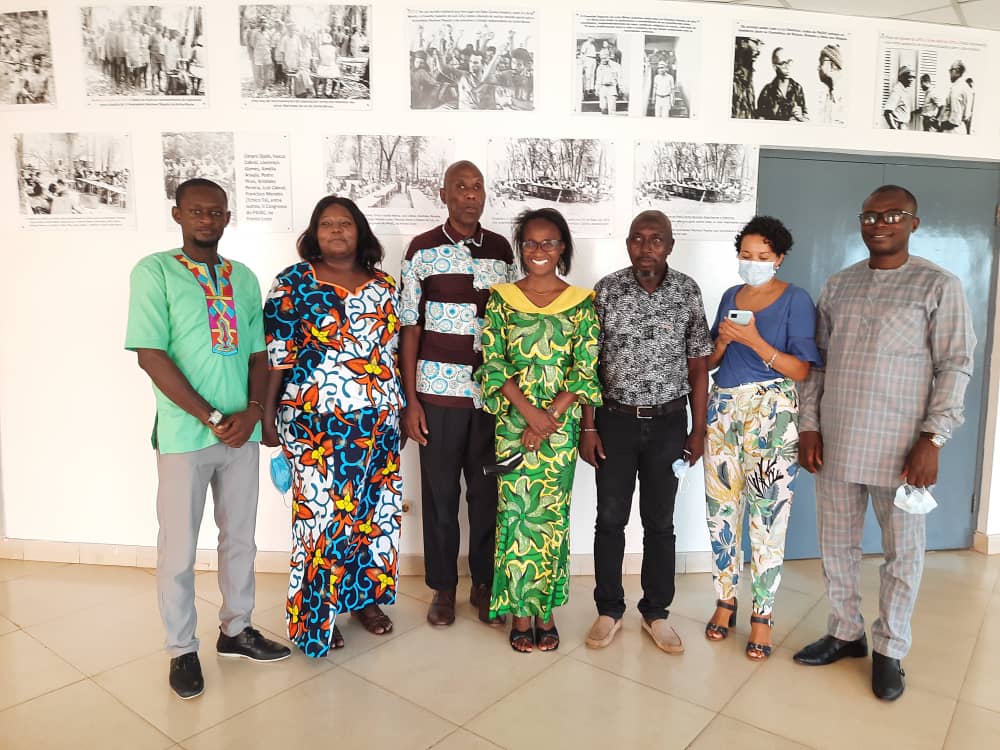
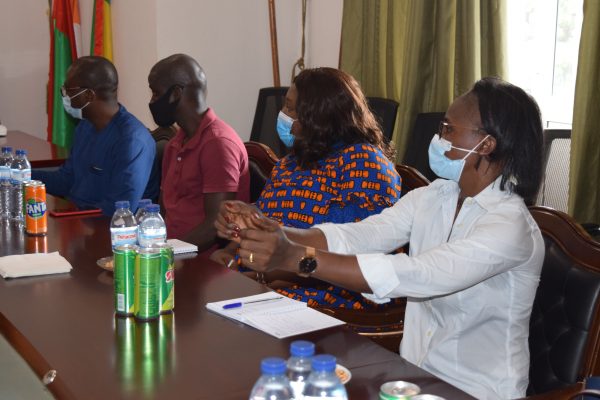
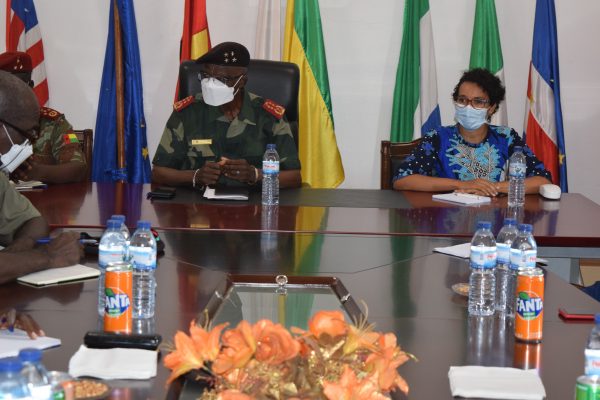
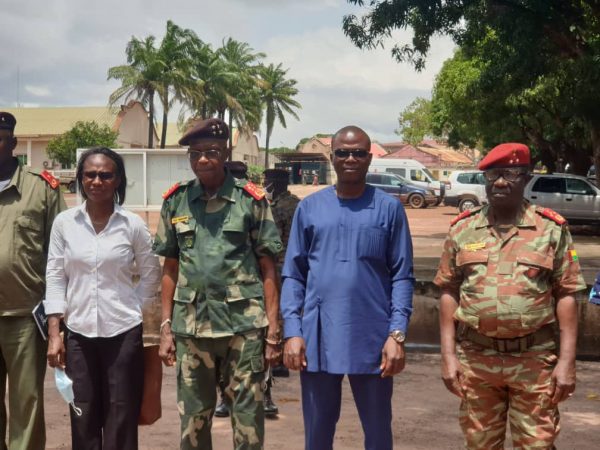

 Minister of Foreign Affairs Nikos Dendias’ interventions at the Parliamentary Standing Committee on National Defence and Foreign Affairs during the elaboration and examination of the Ministry of Foreign Affairs’ draft law “Ratification of the Agreement between the Government of the Hellenic Republic and the Government of the French Republic on establishing a strategic partnership for defence and security cooperation” (05.10.2021)
Minister of Foreign Affairs Nikos Dendias’ interventions at the Parliamentary Standing Committee on National Defence and Foreign Affairs during the elaboration and examination of the Ministry of Foreign Affairs’ draft law “Ratification of the Agreement between the Government of the Hellenic Republic and the Government of the French Republic on establishing a strategic partnership for defence and security cooperation” (05.10.2021)